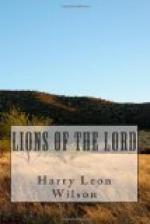Later she brought him a towel when he had washed himself in the tin basin on the bench outside the house. He had doffed the “chapps” and hung them on a peg, the scarlet kerchief was also off, his shirt was open at the neck, and soap and water had played freely over his head. He took the towel from her with a sputtering, “Thank you,” and with a pair of muscular, brown hands proceeded to scour himself dry until the yellow hair stood about him as a halo—without, however, in the least suggesting the angelic or even saintly: for his face, from the friction inflamed to a high degree, was now a mass of red with two inquiring spots of blue near the upper edge. But then the clean mouth opened in its frank smile, and her own dark lashes had to fall upon her cheeks until she turned away.
At supper and afterwards Mr. Follett talked freely of himself, or seemed to. He was from the high plains and the short-grass country, wherever that might be—to the east and south she gathered. He had grown up in that country, working for his father, who had been an overland freighter, until the day the railroad tracks were joined at Promontory. He, himself, had watched the gold and silver spikes driven into the tie of California mahogany two years before; and then, though they still kept a few wagon trains moving to the mining camps north and south of the railroad, they had looked for other occupations.
Now their attention was chiefly devoted to mines and cattle. There were great times ahead in the cattle business. His father remembered when they had killed cattle for their hides and tallow, leaving the meat to the coyotes. But now, each spring, a dozen men, like himself, under a herd boss, would drive five thousand head to Leavenworth, putting them through ten or twelve miles a day over the Abiline trail, keeping them fat and getting good prices for them. There was plenty of room for the business. “Over yonder across the hills,” as Mr. Follett put it. There was a herding ground four hundred miles wide, east and west, and a thousand miles north and south, covered with buffalo grass, especially toward the north, that made good stock feed the year around. He himself had, in winter, followed a herd that drifted from Montana to Texas; and in summer he had twice ranged from Corpus Christi to Deadwood.
Down in the Panhandle they were getting control of a ranch that would cover five thousand square miles. Some day they would have every one of its three million acres enclosed with a stout wire fence. It would be a big ranch, bigger than the whole state of Connecticut—bigger than Delaware and Rhode Island “lumped together”, he had been told. Here they would have the “C lazy C” brand on probably a hundred and fifty thousand head of cattle. He thought the business would settle down to this conservative basis with the loose ends of it pulled together; with closer attention paid to branding, for one thing; branding the calves, so they would no longer have to rope a full-grown steer, and tie it with a scarf such as he wore about his waist.




